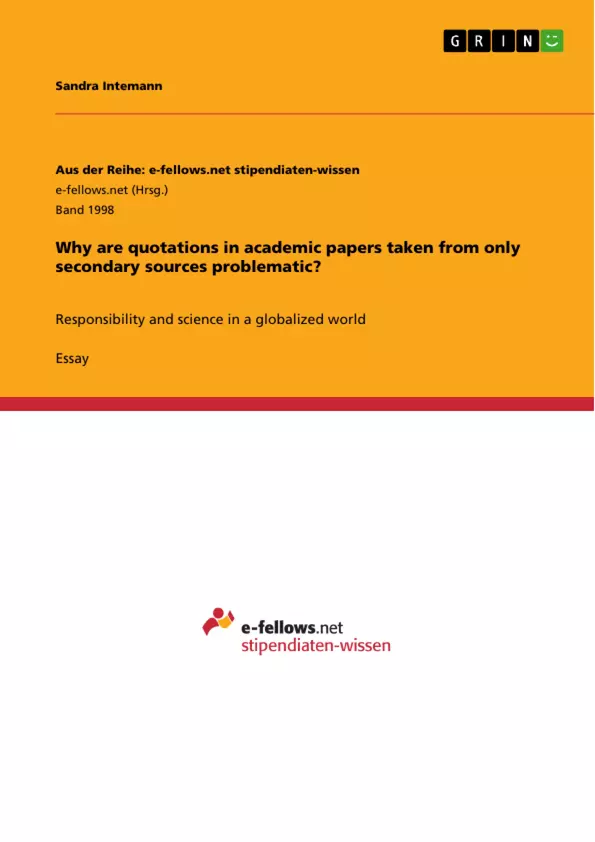To find out whereas quotations in academic articles and/or monographs solely out of secondary and not primary sources are problematic from the perspective of academic ethics in general and business ethics in particular one will first have a closer look on the key terms.
An academic article is a scientific text published in a scientific journal and supervised by other scientists. A monograph is a scientific text about a single subject by one author. Sources are distinguished in primary and secondary sources; primary sources are scientific research results which are published at first hand containing. Secondary sources refer to a primary source which was published by another author and not collected by the author himself. For an evaluation of the use of the sources in a business or academic environment ethical standards and moralities are used. Within academic ethics sscientists have the duty to act responsibly and to define moralities for their practice and the way they do research and publish their results. On the other hand the business ethics defines right or wrong behaviour in a business context.
To discuss whereas the use of secondary sources is problematic one will analyse the involved parties which are the users of the sources, the author of the primary source, the author of the secondary source and the scientific community. Within all parties involved in the problem there is always a least privileged party according to John Rawls. On the one hand using solely sources could be interpreted as one kind of plagiarism even if the source is cited correctly. Further the readers do not make an own effort into research because she takes the easy way out using solely secondary sources. The readers have to wonder whether it is legitimate to rely on the author of the secondary source that he summarized, analysed etc. the primary source correctly. It would have a massive negative impact on academic and business ethics if the author of the secondary source made a mistake in summarizing, analysing or wrong conclusion drawing.
As a result, wrong information would be used for following work in business areas or research in academic areas. On the other hand the access to primary sources may be difficult or even not possible, so the use of a secondary source is the only way to use the information. Further one has to wonder whether it is it legal to intervene to solely use secondary sources as it violates the copyright law.
Inhaltsverzeichnis (Table of Contents)
- ABSTRACT
- INTRODUCTION
- THEORETICAL FOUNDATION
- Primary Sources
- Secondary Sources
- Academic Ethics
- Business Ethics
- IMPLICATIONS FOR THE RESEARCH QUESTION
- CONCLUSION
- LIST OF REFERENCES
Zielsetzung und Themenschwerpunkte (Objectives and Key Themes)
This essay aims to determine why solely relying on secondary sources for quotations in academic articles and monographs presents ethical challenges within the framework of both academic and business ethics.
- Analyzing the ethical implications of relying solely on secondary sources
- Investigating the potential for plagiarism and the importance of original research
- Examining the impact on readers' access to accurate and reliable information
- Exploring the ethical responsibilities of authors and researchers
- Determining the role of academic and business ethics in ensuring ethical research practices
Zusammenfassung der Kapitel (Chapter Summaries)
The abstract introduces the core research question and outlines the essay's structure. It defines key terms like primary and secondary sources, academic ethics, and business ethics. The introduction further defines the problem arising from the use of secondary sources, outlining the essay's approach and introducing the hypothetical user, Lisa, to provide a concrete example.
The theoretical foundation chapter provides a detailed exploration of primary and secondary sources, explaining their characteristics and distinctions. It also analyzes the role of academic ethics and business ethics, emphasizing the need for responsible research practices and the ethical implications of scientific misconduct. The chapter highlights the importance of using both primary and secondary sources in academic work, emphasizing the need for accountability and transparency in scientific research.
The implications for the research question chapter focuses on analyzing the ethical and legal aspects of solely using secondary sources. The chapter examines the potential for plagiarism, the responsibility of authors and readers, and the legal implications related to copyright law.
Schlüsselwörter (Keywords)
This essay explores the ethical implications of using secondary sources in academic articles and monographs, focusing on academic ethics, business ethics, plagiarism, original research, and the responsibility of authors and readers. The essay utilizes a framework of ethical analysis, exploring the perspectives of involved parties and analyzing the legal and philosophical foundations of ethical research practices.
Frequently Asked Questions
Why is relying solely on secondary sources problematic in academic writing?
It raises ethical concerns because the researcher relies on another author's interpretation rather than the original data, which can lead to the spread of incorrect summaries or conclusions.
What is the difference between a primary and a secondary source?
Primary sources are original research results published at first hand. Secondary sources refer to and analyze primary sources published by other authors.
Can using only secondary sources be considered plagiarism?
Even if cited correctly, it can be interpreted as a lack of original effort or "taking the easy way out," which challenges the standards of academic ethics.
How does John Rawls' theory apply to this problem?
The essay uses Rawls' framework to identify the "least privileged party" in the scientific community when ethical standards regarding source usage are violated.
Are there situations where secondary sources are acceptable?
Yes, if a primary source is inaccessible or no longer exists, using a secondary source may be the only way to obtain the information, though it should be noted.
- Citar trabajo
- Sandra Intemann (Autor), 2016, Why are quotations in academic papers taken from only secondary sources problematic?, Múnich, GRIN Verlag, https://www.grin.com/document/336454



